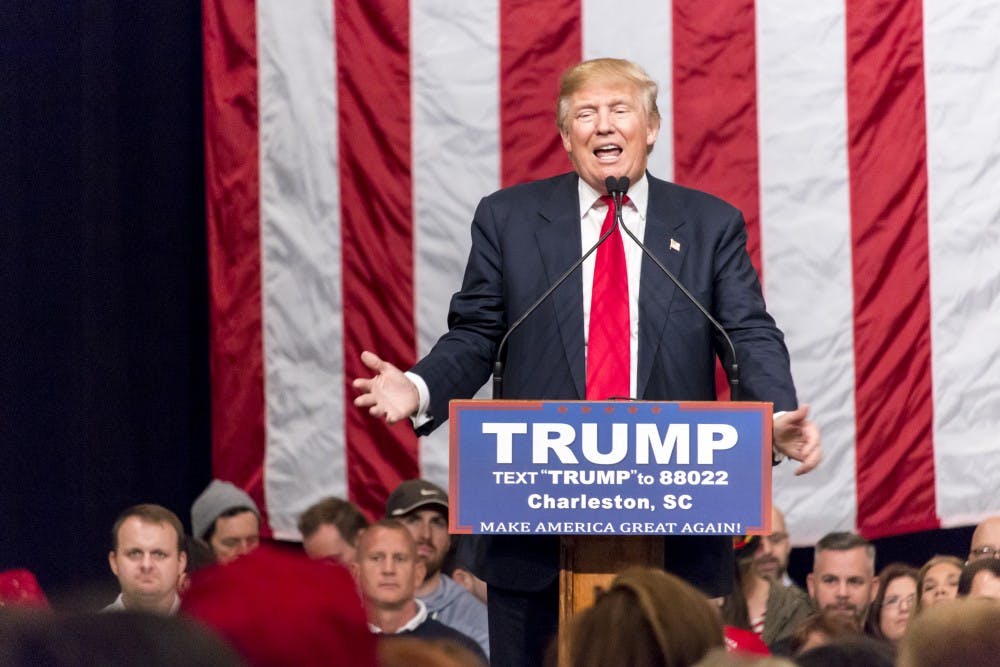
1,716 Penn students, graduates, parents, partners and family members signed a petition condemning 1968 Wharton Graduate and presumptive Republican Party Nominee, Donald Trump
When Donald Trump announced his candidacy for president last summer, many believed the action would go down in history as a classic case of narcissistic political folly. Yet, a year later, Trump has officially become the Republican presidential nominee despite having no prior political experience.
The 1968 Wharton graduate formally accepted the party’s nomination in a televised speech Thursday night. Trump, who entered the convention on Monday as the sole remaining candidate for the Republican nomination, won the 1,237 delegate votes required to become the nominee. However, per political tradition, he did not formally accept the nomination until the end of the convention.
In his acceptance speech, which was leaked to the media early Thursday, Trump outlined a lengthy list of policy priorities that would guide his presidency. The speech expressed a number of specific political positions and concrete campaign promises, typically missing in Trump’s public speeches.
For example, Trump explicitly voiced support for the Second Amendment and vowed to appoint a Supreme Court justice with traditionally conservative judicial beliefs. He promised steadfast support to Israel in the Middle East and praised NATO’s new efforts to combat terrorism in Europe. He also said he would repeal Obamacare and promised to tackle growing levels of student loan debt.
He expressed support for the LGBTQ community, thanking the audience for cheering when he expressed grief for the LGBTQ victims of last month’s shooting in Orlando.
Trump’s promise to force every federal agency to provide him with a list of wasteful spending projects for elimination within his first 100 days in office prompted loud chants of “Yes you will” from the audience.
Much of the speech, however, painted a bleak image of modern America as unsafe, unstable and reeking with poverty and economic stagnation. Trump emphasized his status as a political outsider — a familiar theme of his campaign — and promised that he would not repeat the mistakes made by the incumbent political establishment.
“The problems we face now – poverty and violence at home, war and destruction abroad – will last only as long as we continue relying on the same politicians who created them,” Trump said. “A change in leadership is required to change these outcomes.”
Throughout the speech, Trump promised to return security to the streets, repeatedly calling himself the “law and order” candidate. Referring to a series of recent controversies involving allegations of police brutality, including this summer’s shootings in Dallas and Baton Rouge, La., he vowed to protect law enforcement officers and claimed that the Obama administration had hitherto ignored the families of fallen policemen.
“An attack on law enforcement is an attack on all Americans,” Trump said.
Trump also expressed his solidarity with border patrol officers and promised to strictly enforce all immigration laws. The speech linked illegal immigration with crime, citing recent crimes committed by illegal aliens in sanctuary cities. The image of illegal aliens as gangsters or terrorists, common themes throughout Trump’s campaign, featured prominently — as did his plan to build a wall on the U.S.-Mexico border.
However, he added that in doing so, his administration would be “considerate and compassionate” when giving immigrants the “respect they deserve.”
Much of the speech was dedicated to criticizing Hillary Clinton’s foreign policy record as Secretary of State. Trump held Clinton directly responsible for the last few years’ American foreign policy disasters in the Middle East, from the spread of the ISIS and the rise of Egypt’s radical Muslim Brotherhood to the death of an American ambassador in Benghazi. He said that President Obama “truly regrets” appointing Clinton as Secretary of State in 2008.
“This is the legacy of Hillary Clinton: death, destruction and weakness," Trump said. “After fifteen years of wars in the Middle East, after trillions of dollars spent and thousands of lives lost, the situation is worse than it has ever been before.”
The speech reiterated Trump’s belief that Clinton should face criminal charges for her mishandling of classified emails during her tenure in the State Department. Trump used Clinton as an illustration of corruption at “a level like never before.”
“Her single greatest accomplishment may be committing such an egregious crime and getting away with it – especially when others have paid so dearly,” Trump said.
The end of the speech echoed the Trump campaign’s longstanding message that he would stand up for average Americans against special interests and big government. Trump promised to reject any international free trade deals in favor of customized trade agreements negotiated with individual countries. He said he would do everything he could to keep American industries in the U.S., and use the profits to fund infrastructure improvements.
“I am not going to let companies move to other countries, firing their employees along the way, without consequences,” Trump said.
Trump’s acceptance of the Republican nomination marks a historic moment in what has proven to be an unprecedented year in American political history. Trump, who has famously touted his successful business operations and degree from the Wharton School of Finance as evidence of his leadership abilities, is the first-ever nominee for a major American political party with no previous experience in elected or appointed office.
He will face likely Democratic nominee Hillary Clinton in the general election on Nov. 8.
The Daily Pennsylvanian is an independent, student-run newspaper. Please consider making a donation to support the coverage that shapes the University. Your generosity ensures a future of strong journalism at Penn.
DonatePlease note All comments are eligible for publication in The Daily Pennsylvanian.








